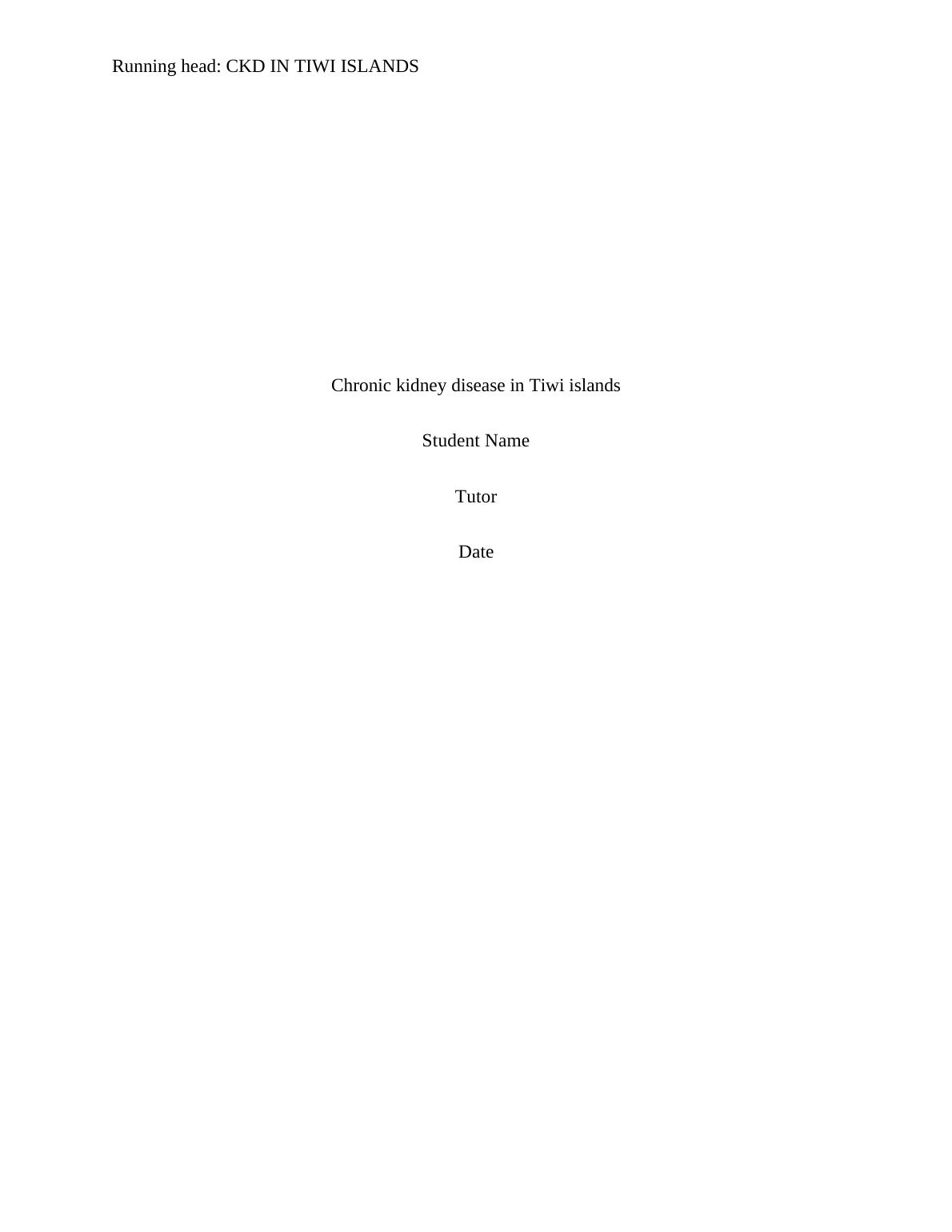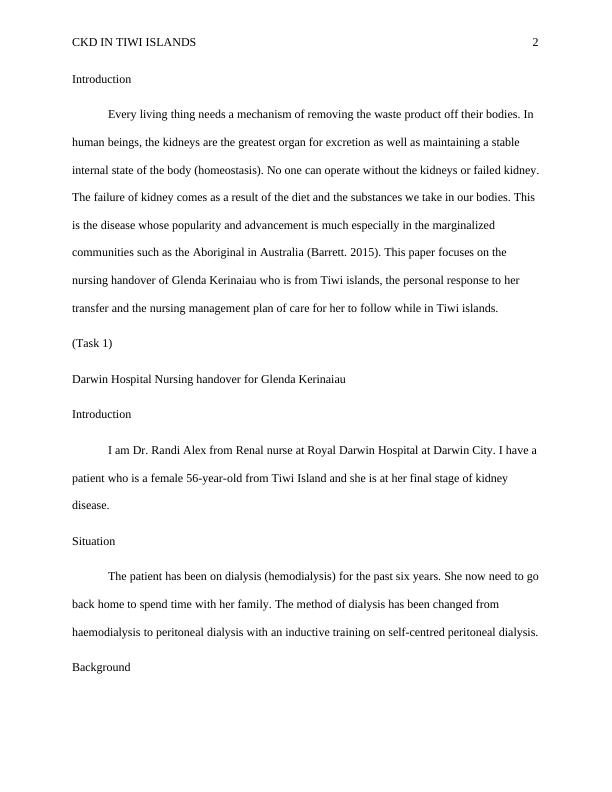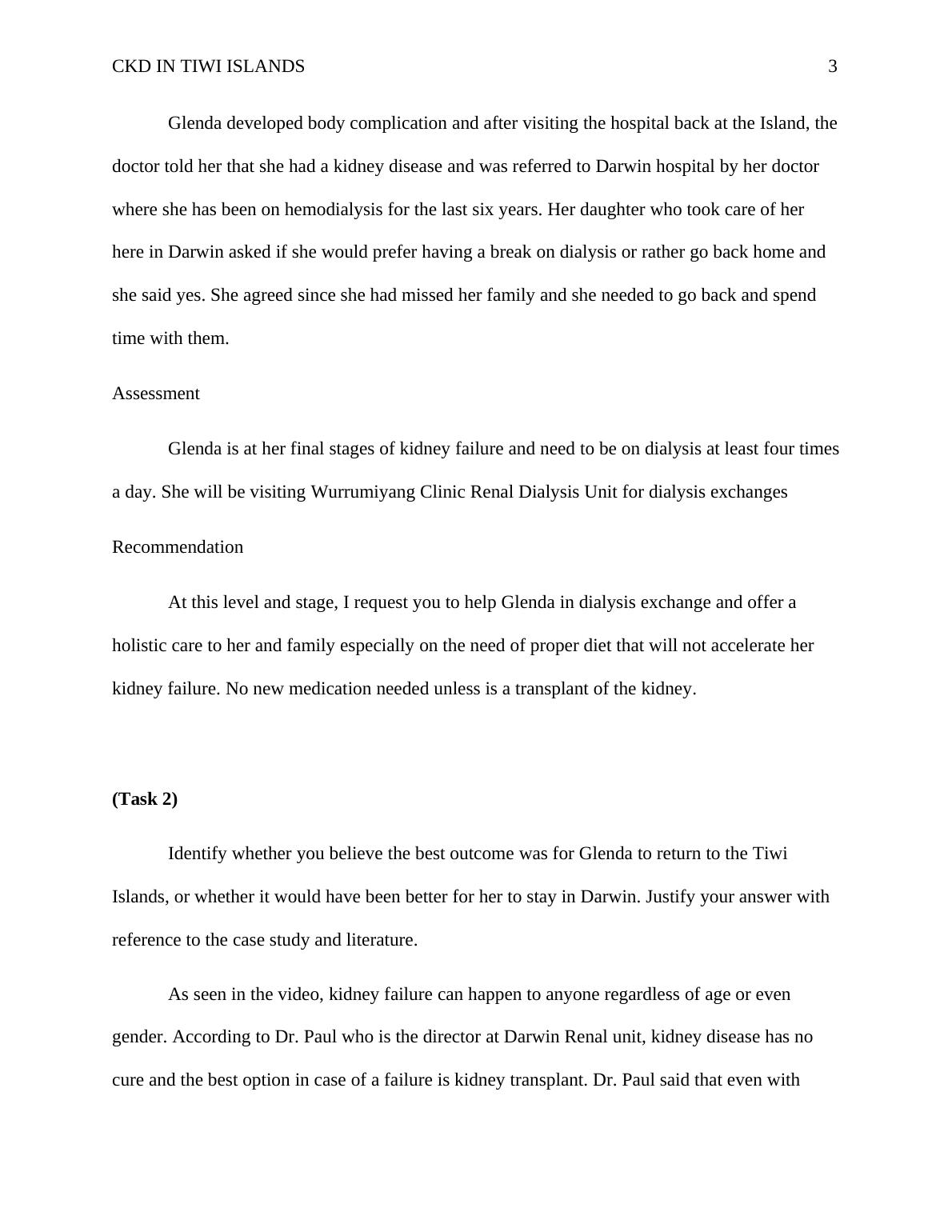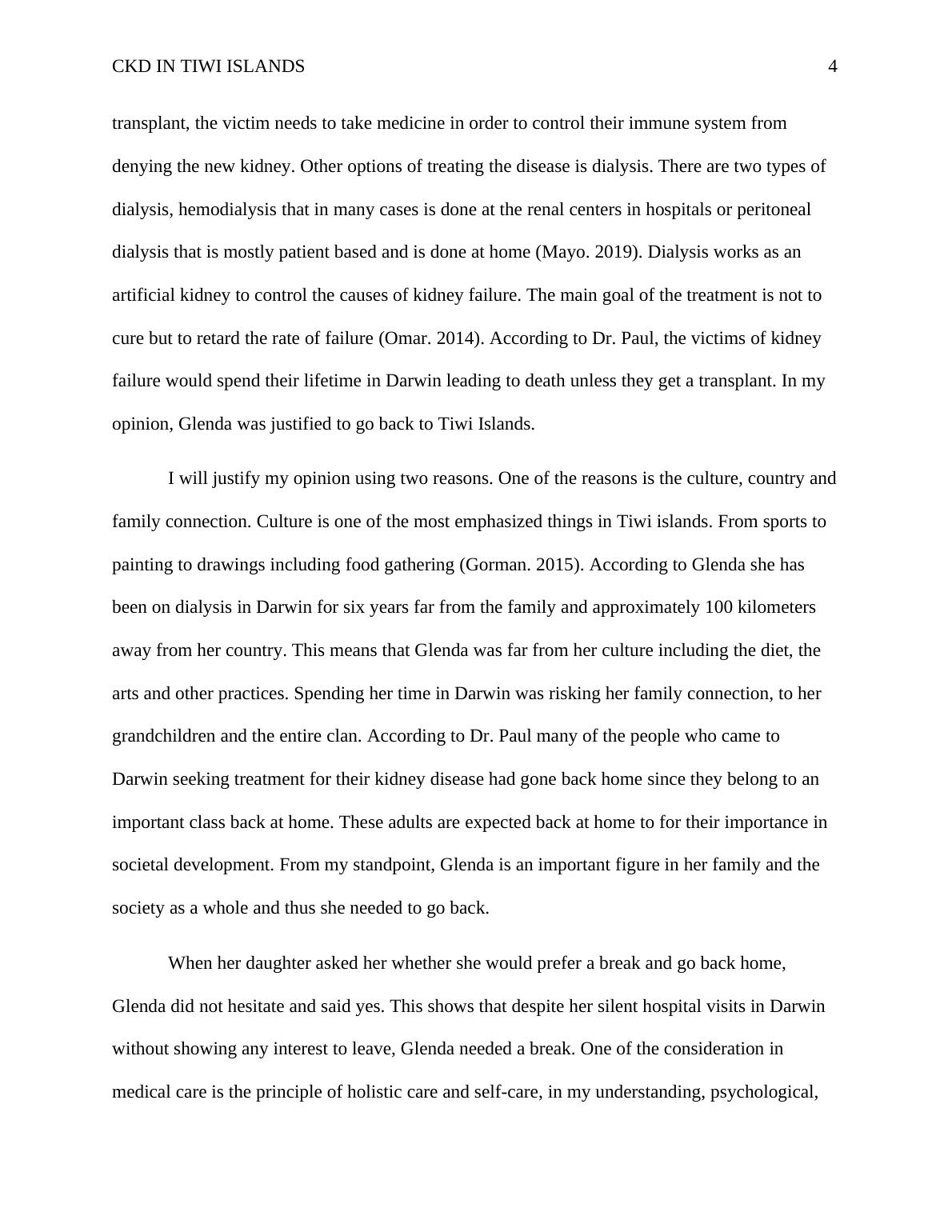Chronic Kidney Disease in Tiwi Islands
Added on 2023-01-05
12 Pages2793 Words91 Views
Running head: CKD IN TIWI ISLANDS
Chronic kidney disease in Tiwi islands
Student Name
Tutor
Date
Chronic kidney disease in Tiwi islands
Student Name
Tutor
Date

CKD IN TIWI ISLANDS 2
Introduction
Every living thing needs a mechanism of removing the waste product off their bodies. In
human beings, the kidneys are the greatest organ for excretion as well as maintaining a stable
internal state of the body (homeostasis). No one can operate without the kidneys or failed kidney.
The failure of kidney comes as a result of the diet and the substances we take in our bodies. This
is the disease whose popularity and advancement is much especially in the marginalized
communities such as the Aboriginal in Australia (Barrett. 2015). This paper focuses on the
nursing handover of Glenda Kerinaiau who is from Tiwi islands, the personal response to her
transfer and the nursing management plan of care for her to follow while in Tiwi islands.
(Task 1)
Darwin Hospital Nursing handover for Glenda Kerinaiau
Introduction
I am Dr. Randi Alex from Renal nurse at Royal Darwin Hospital at Darwin City. I have a
patient who is a female 56-year-old from Tiwi Island and she is at her final stage of kidney
disease.
Situation
The patient has been on dialysis (hemodialysis) for the past six years. She now need to go
back home to spend time with her family. The method of dialysis has been changed from
haemodialysis to peritoneal dialysis with an inductive training on self-centred peritoneal dialysis.
Background
Introduction
Every living thing needs a mechanism of removing the waste product off their bodies. In
human beings, the kidneys are the greatest organ for excretion as well as maintaining a stable
internal state of the body (homeostasis). No one can operate without the kidneys or failed kidney.
The failure of kidney comes as a result of the diet and the substances we take in our bodies. This
is the disease whose popularity and advancement is much especially in the marginalized
communities such as the Aboriginal in Australia (Barrett. 2015). This paper focuses on the
nursing handover of Glenda Kerinaiau who is from Tiwi islands, the personal response to her
transfer and the nursing management plan of care for her to follow while in Tiwi islands.
(Task 1)
Darwin Hospital Nursing handover for Glenda Kerinaiau
Introduction
I am Dr. Randi Alex from Renal nurse at Royal Darwin Hospital at Darwin City. I have a
patient who is a female 56-year-old from Tiwi Island and she is at her final stage of kidney
disease.
Situation
The patient has been on dialysis (hemodialysis) for the past six years. She now need to go
back home to spend time with her family. The method of dialysis has been changed from
haemodialysis to peritoneal dialysis with an inductive training on self-centred peritoneal dialysis.
Background

CKD IN TIWI ISLANDS 3
Glenda developed body complication and after visiting the hospital back at the Island, the
doctor told her that she had a kidney disease and was referred to Darwin hospital by her doctor
where she has been on hemodialysis for the last six years. Her daughter who took care of her
here in Darwin asked if she would prefer having a break on dialysis or rather go back home and
she said yes. She agreed since she had missed her family and she needed to go back and spend
time with them.
Assessment
Glenda is at her final stages of kidney failure and need to be on dialysis at least four times
a day. She will be visiting Wurrumiyang Clinic Renal Dialysis Unit for dialysis exchanges
Recommendation
At this level and stage, I request you to help Glenda in dialysis exchange and offer a
holistic care to her and family especially on the need of proper diet that will not accelerate her
kidney failure. No new medication needed unless is a transplant of the kidney.
(Task 2)
Identify whether you believe the best outcome was for Glenda to return to the Tiwi
Islands, or whether it would have been better for her to stay in Darwin. Justify your answer with
reference to the case study and literature.
As seen in the video, kidney failure can happen to anyone regardless of age or even
gender. According to Dr. Paul who is the director at Darwin Renal unit, kidney disease has no
cure and the best option in case of a failure is kidney transplant. Dr. Paul said that even with
Glenda developed body complication and after visiting the hospital back at the Island, the
doctor told her that she had a kidney disease and was referred to Darwin hospital by her doctor
where she has been on hemodialysis for the last six years. Her daughter who took care of her
here in Darwin asked if she would prefer having a break on dialysis or rather go back home and
she said yes. She agreed since she had missed her family and she needed to go back and spend
time with them.
Assessment
Glenda is at her final stages of kidney failure and need to be on dialysis at least four times
a day. She will be visiting Wurrumiyang Clinic Renal Dialysis Unit for dialysis exchanges
Recommendation
At this level and stage, I request you to help Glenda in dialysis exchange and offer a
holistic care to her and family especially on the need of proper diet that will not accelerate her
kidney failure. No new medication needed unless is a transplant of the kidney.
(Task 2)
Identify whether you believe the best outcome was for Glenda to return to the Tiwi
Islands, or whether it would have been better for her to stay in Darwin. Justify your answer with
reference to the case study and literature.
As seen in the video, kidney failure can happen to anyone regardless of age or even
gender. According to Dr. Paul who is the director at Darwin Renal unit, kidney disease has no
cure and the best option in case of a failure is kidney transplant. Dr. Paul said that even with

CKD IN TIWI ISLANDS 4
transplant, the victim needs to take medicine in order to control their immune system from
denying the new kidney. Other options of treating the disease is dialysis. There are two types of
dialysis, hemodialysis that in many cases is done at the renal centers in hospitals or peritoneal
dialysis that is mostly patient based and is done at home (Mayo. 2019). Dialysis works as an
artificial kidney to control the causes of kidney failure. The main goal of the treatment is not to
cure but to retard the rate of failure (Omar. 2014). According to Dr. Paul, the victims of kidney
failure would spend their lifetime in Darwin leading to death unless they get a transplant. In my
opinion, Glenda was justified to go back to Tiwi Islands.
I will justify my opinion using two reasons. One of the reasons is the culture, country and
family connection. Culture is one of the most emphasized things in Tiwi islands. From sports to
painting to drawings including food gathering (Gorman. 2015). According to Glenda she has
been on dialysis in Darwin for six years far from the family and approximately 100 kilometers
away from her country. This means that Glenda was far from her culture including the diet, the
arts and other practices. Spending her time in Darwin was risking her family connection, to her
grandchildren and the entire clan. According to Dr. Paul many of the people who came to
Darwin seeking treatment for their kidney disease had gone back home since they belong to an
important class back at home. These adults are expected back at home to for their importance in
societal development. From my standpoint, Glenda is an important figure in her family and the
society as a whole and thus she needed to go back.
When her daughter asked her whether she would prefer a break and go back home,
Glenda did not hesitate and said yes. This shows that despite her silent hospital visits in Darwin
without showing any interest to leave, Glenda needed a break. One of the consideration in
medical care is the principle of holistic care and self-care, in my understanding, psychological,
transplant, the victim needs to take medicine in order to control their immune system from
denying the new kidney. Other options of treating the disease is dialysis. There are two types of
dialysis, hemodialysis that in many cases is done at the renal centers in hospitals or peritoneal
dialysis that is mostly patient based and is done at home (Mayo. 2019). Dialysis works as an
artificial kidney to control the causes of kidney failure. The main goal of the treatment is not to
cure but to retard the rate of failure (Omar. 2014). According to Dr. Paul, the victims of kidney
failure would spend their lifetime in Darwin leading to death unless they get a transplant. In my
opinion, Glenda was justified to go back to Tiwi Islands.
I will justify my opinion using two reasons. One of the reasons is the culture, country and
family connection. Culture is one of the most emphasized things in Tiwi islands. From sports to
painting to drawings including food gathering (Gorman. 2015). According to Glenda she has
been on dialysis in Darwin for six years far from the family and approximately 100 kilometers
away from her country. This means that Glenda was far from her culture including the diet, the
arts and other practices. Spending her time in Darwin was risking her family connection, to her
grandchildren and the entire clan. According to Dr. Paul many of the people who came to
Darwin seeking treatment for their kidney disease had gone back home since they belong to an
important class back at home. These adults are expected back at home to for their importance in
societal development. From my standpoint, Glenda is an important figure in her family and the
society as a whole and thus she needed to go back.
When her daughter asked her whether she would prefer a break and go back home,
Glenda did not hesitate and said yes. This shows that despite her silent hospital visits in Darwin
without showing any interest to leave, Glenda needed a break. One of the consideration in
medical care is the principle of holistic care and self-care, in my understanding, psychological,

End of preview
Want to access all the pages? Upload your documents or become a member.
Related Documents
Glenda Chronic Kidney Disease Assessment 2022lg...
|11
|2646
|17
Chronic Kidney Disease: A Case Studylg...
|12
|3166
|494
Case Study on Nursing Paper 2022lg...
|10
|3163
|36
Qualitative Research Report- Empathetic Understandinglg...
|11
|3121
|39
Assessment What is a case study?lg...
|20
|4148
|22